 One of the long term ambitions of the Brasenose College archives team is to open up the collections we care for to a wider audience. The National Archives, as part of their annual Explore Your Archive campaign, are spearheading such initiatives and ensuring that records kept in archives around the country are collected, made safe and accessible for the future.
One of the long term ambitions of the Brasenose College archives team is to open up the collections we care for to a wider audience. The National Archives, as part of their annual Explore Your Archive campaign, are spearheading such initiatives and ensuring that records kept in archives around the country are collected, made safe and accessible for the future.
We can use the college’s archives to discover many things about the history of Brasenose and bring the past back to life! A current project in the archives is the listing of uncatalogued material. This includes records of staff, who have been part of the life of the college since its earliest days.
A very important part of the archives collections, the college statutes, which declare college purpose and governance were first written by William Smyth, Bishop of Lincoln. These statutes tell us that the first servants were the Steward of the Common Hall, the Manciple (in charge of purchasing and storing food), a Bible-clerk, the Butler, a Head cook, one Porter (who also acted as the college barber) and the only woman employed by the college, a Laundress, who was not allowed within the gates.
Alongside these employees, the college also used many local tradesmen including carpenters, joiners, blacksmiths, glaziers, ironmongers, masons, painters, plumbers, silversmiths, brewers, butchers, gardeners and coopers amongst others. The archives’ collections of tradesmen’s bills, which are particularly numerous for the 1700s, indicate that college was paying these tradesmen for their services as and when needed, for a great variety of jobs.
It was common for more than one member of the same family to be employed by the college. During the 1760s-1780s three members of the Brucker family were employed – James, John and William. Not all of these relations ended on a good note, however, with James Brucker, being committed to Oxford Castle (at that time, used as a jail) in 1788. He was charged ‘on violent suspicion of feloniously stealing and carrying away forty-eight dozen and four bottles of red port wine’. Brucker was sentenced to death but was later reprieved to transportation to Australia for life.
College staff were and continue to be long serving and the amount of reports from the Oxford Mail and in the college’s magazine, the Brazen Nose, testify to this. Between 1900 and 1916 we have schedules of college servants’ salaries which clearly show that once employed in the College members of staff would often change their roles. Staff would also be paid additional wages for moving furniture or waiting on High Table.
Women servants were not so prevalent and the picture found in this article, of the servants dated 1861, shows an all-male team. They did however certainly exist. Amongst some of the uncatalogued material is a letter written to A.J. Butler, the college Bursar, from Katie Annie Dubber, dated 16 August 1906. In her letter Katie informs Butler of the death of her mother, saying ‘my mother has been a servant of the College for a very long time, in fact from the year 1839 when she commenced to help her mother in the College work continuously down til last September when her health failed her.’ However we are yet to find evidence that these women were allowed inside the college. It must have happened at some point during the later 1800s, as by 1900 we find evidence of a scullery-woman in the kitchens and the Principal having a parlour maid.
By the end of the nineteenth century staff were gaining more rights, with the introduction of old age pensions, long vacation leave and staff socials. The origins of staff Christmas parties can be traced back to January 1882, when the wives of the servants were asked to join the Principal and Fellows at a dinner held in the Christmas vacation. Three wives attended but the younger members of staff soon after formed a committee to arrange ‘something more interesting’. A supper and social evening thereafter became an annual fixture, and by 1889, it was reported to the Vice-Principal that attendance at the event numbered about 60, with servants, their wives and assistants (including apprentices, kitchens, stores and staircase boys). The annual party minute books (1888-1903) detail that at staff parties there was almost always a live band, dancing, alcohol (port and sherry), tea and coffee, dessert and biscuits, cheese and decorations.
Today, Brasenose employs over a hundred domestic and administrative staff. From cleaning staff, to the finance team, to skilled tradesman in the workshop, librarians, a schools liaison officer, academic administrator, professional cooks, alumni office, HR team, conference officers, admissions officer and many more – all staff are dedicated to running a modern, progressive academic institution for students and tutors.
This archive project is ongoing and we eventually hope to be able to produce a comprehensive history of college staff, alongside a completed catalogue of material in the collections relating to them.
